How to Conduct Keyword Research for SEO
Keyword research remains a crucial element of SEO, even as search engine algorithms continue to evolve. By conducting a thorough keyword research, you can identify the specific terms and phrases your target audience is searching for.
However, it’s important to note that keyword research should be one of many focuses of your SEO strategy. You also need to create high-quality content that is relevant and valuable to your target audience, optimize your website’s technical structure and on-page elements, and build quality backlinks from high DA sources.

Additionally, as search engine algorithms continue to become more sophisticated, they emphasize user intent and context. Simply targeting specific keywords may no longer be enough to rank well in search results. Instead, you need to create content that addresses your target audience’s particular needs and questions and provides them with valuable insights and solutions.
Here in this blog, we’ll deep dive into keyword research, why it’s significant, how to direct your examination for your Web optimization technique, and pick the right keywords for your website.
What is Keyword Research?
Keyword research is identifying the specific words and phrases people use when searching for information online relevant to your business. It is one of the fundamental aspects of SEO, as it helps website owners understand the language and terminology their target audience uses when searching for information related to their products or services.
The keyword research process typically involves using keyword research tools to identify relevant keywords and phrases. These tools provide information about each keyword’s search volume, competition, and potential ranking difficulty.
By conducting thorough keyword research and incorporating relevant keywords into your website’s content, you can improve your website’s visibility and search engine rankings and drive more traffic to your website over time.
Why is keyword research important?
Keyword research is an essential aspect of SEO and Digital Marketing for several reasons:
- Helps understand the audience: Keyword research enables you to understand the language and terminology your target audience uses when searching for information about your products or services. By understanding their search behavior, you can create content targeting your audience’s needs and interests.
- Improves content quality: Keyword research helps you identify the topics and themes most relevant to your target audience. By incorporating these keywords into your content, you can create high-quality content that is informative and relevant to your audience.
- Increases organic visibility and traffic: You can improve your website’s visibility and search engine rankings by targeting specific keywords in your content. This can help drive more traffic to your website and increase your online visibility.
- Competitive analysis: Keyword research can also help you identify the keywords your competitors are targeting. You can identify gaps in your strategy by analyzing their keyword strategy and creating content that addresses them.
- Provides insights for other marketing channels: Keyword research can also provide insights that can be applied to other marketing channels, such as social media or paid search. Understanding your audience’s language and terminology can create more effective marketing campaigns that resonate with your target audience.
Key Elements of Keyword Research
When conducting keyword research, paying attention to three main elements: Relevance, Authority, and search volume are essential.
-
- Relevance: A keyword’s relevance refers to how closely it matches the intent behind a user’s search query. Creating content that satisfies users’ needs by searching for a particular keyword is essential.

- Relevance: A keyword’s relevance refers to how closely it matches the intent behind a user’s search query. Creating content that satisfies users’ needs by searching for a particular keyword is essential.
- Authority: Authority refers to how trusted and authoritative your website is perceived by search engines. Building your website’s authority can help you rank higher for relevant keywords.
- Search Volume: Search volume refers to the number of searches a particular keyword receives in a given period. Targeting keywords with sufficient search volume is essential to attract traffic to your website.
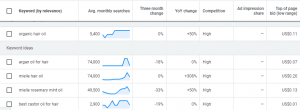 Considering all three elements in keyword research helps to identify high-value keywords relevant to your target audience and achievable based on your website’s authority.
Considering all three elements in keyword research helps to identify high-value keywords relevant to your target audience and achievable based on your website’s authority.
Keyword Research Process: Key Fundamentals
The first step in conducting keyword research for content optimization is to familiarize yourself with some fundamental concepts. It would be best if you understood the differences between focus keywords, long-tail keywords, and common keywords in particular.
![]()
In your target market, your ideal keyword has a high search volume but little competition. By concentrating primarily on keywords with strong competition, you’re setting yourself up for a challenging battle.
- Focus Keyword (Primary Search Term): The key phrase or word you deliberately use in your website’s URL structure, meta tags, and body text so that the search engines will easily crawl it.
- Long-tail Keywords: As the name suggests, these are long search terms (containing two or more words) that users are more likely to use when they are further along in the searching cycle and have a more apparent notion of what they want, resulting in the generation of more qualified traffic. Long-tail keywords become more significant when there is much competition in the industry; they are an excellent method for websites to stand out. The difference between the search phrases “mobile” and “buy mobile under 5000” makes it clear, which will provide more accurate results.
- Keyword Intent: A critical component of conducting a keyword research strategy is understanding how keyword intent affects keyword research. You may not share the perspective of your target audience because you are intimately familiar with your industry. To properly understand the intent of a keyword, you must put yourself in the position of a potential customer.

Types of Keyword Intent
- Informational: User with an informational intent searching for a specific query or wants to learn more about a particular subject/topic (For ex: how to fix a dead car battery)
- Navigational: user with navigational intent looking for a specific website or company (For ex: cardekho.com)
- Transactional: User with this intent seeking to make a purchase (For ex: buy maintenance-free car battery online)
- Commercial: The user is likewise interested in transactions but needs more time and convincing. These search intentions are frequently referred to as commercial investigating intentions. (For Ex: best battery for racing cars)
Keyword Modifiers by Intent Type
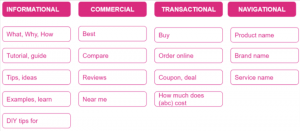
Let’s Getting Start with Keyword Research Process
1. Create a rough list of search terms
To start, you should make a spreadsheet with broad categories or “buckets” for the keywords you think your target audience would search; these could be related to product/service categories or anything else.
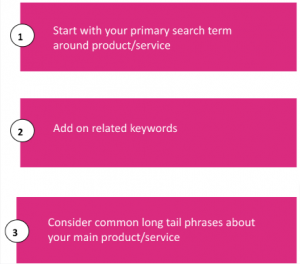
2. Keyword Brainstorming:
Use Extended Keyword Framework
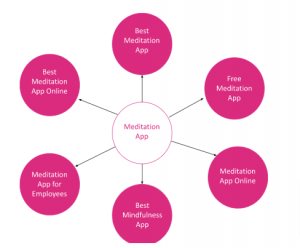
Sometimes, keyword frameworks suggest keywords with little to no search volume. Although they may not have significant term search traffic, bottom-funnel keywords can still generate conversions, so they’re still worth including on your list.
3. Research for Related Search Terms
There are ample ways to find relevant keywords.
- Search via SERP: Type in a keyword in SERP, and you will get autocomplete keywords suggestions and the list of other related search terms at the bottom of the page.
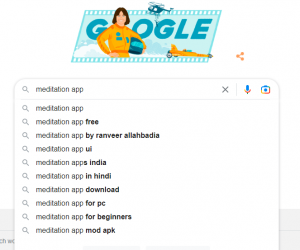
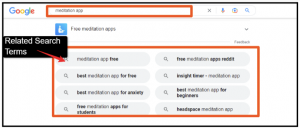
- Deep dive by selecting one of the related search terms and look out for the list Google suggests at the bottom of that second page.
- Take help from Google’s Keyword Planner to discover new potential keywords best suited for your business and know about search estimates.
4. Analyze Potential Keywords
Using a paid keyword research or SEO tool, such as Keyword Planner, is the most straightforward approach to do the following step. Some of the more well-known ones include Ahrefs, Semrush, and Wordtracker.
Key facts to consider while analyzing your keywords:
- Make sure the keyword matches the exact query the user search for
- Check keyword search volume. If it’s zero, it won’t have a powerful impact. Look for medium-to-high search volume keywords.
- What’s the competition around the keywords? Considering higher search volume with lower organic search competition is a profitable strategy.
- Discover-related keywords that got missed have high search volume and low organic search competition.
5. Discover Ranking Time-Frame
If you’re up against well-known brands that already dominate the first page of Google’s SERP for most of the phrases you’ve chosen, you should adjust your approach to find less-competitive long-tail keywords.
For the ideal search keywords, check the SERP. Refine your list with long-tail keywords if it’s full of reputable brands with more significant impact and market share than your business now enjoys.
This tactic will only work if your rivals have produced high-quality material. Even if they spend more money marketing their brand, you can outrank them if you know you can surpass their material in length, quality, and structure.
6. Keyword Search Intent Validation
Every query a user types into Google must have a corresponding response since they are actively looking for something.
By entering your search query into a search engine, you can ensure you comprehend your clients’ purpose. What pages rank for that term, and what services do they provide?
For example, If you try to offer a product to a customer seeking information, you may receive a click, but the customer will leave shortly, which may lower your rating. Yet, if a customer is prepared to make a purchase and you offer a product page, they will gladly do so.
Useful Keyword Tools
Enlisting a few best keyword research tools helps to conduct potential keyword research
SEMRush
SEMRush tool helps to provide 5 essential data:
- Keyword Magic Tool: based on seed keyword, it helps to find related keyword ideas

- Organic Research: identifying competitor’s top performing keywords
- Keyword Gap: basis the competitor’s comparison, provides keywords you’re missing out
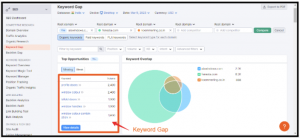
- Keyword Overview: getting a keyword-wise detailed analysis and its search results
- Keyword Manager: monitoring and maintaining keyword lists
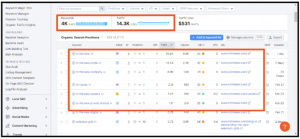
Google Search Console
It is an excellent tool for determining the keywords you rank for and how many clicks and impressions you receive in Google searches. Considering those keywords, you can search related search terms around it.

Google Keyword Planner
Google Keyword Planner is one of the most popular and well-known keyword research tools, ideal for both paid and organic. The fact that Google Keyword Planner is free and uses Google data makes it a good choice for keyword research.
Keyword Planner has many benefits, including the opportunity to discover new keywords pertinent to your goal and how frequently users look for them each month.
Google Trends
Google Trends is a vital and helpful tool when it comes to
-
- Providing real-time trending topics/search terms
- Popularity comparison between two or more search terms
- Determining a keyword’s expected long-term popularity
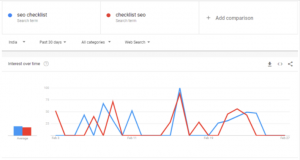
Frequently Asked Questions
- How to become a PRO at keyword research?
To become PRO at keyword research, you need to understand your target audience’s demographics and the precise nature of their needs. It’s also crucial to monitor your analytics and outcomes. For instance, you may quickly determine which keywords and landing pages are working well using the data from Google Analytics. Create a plan to improve and adjust your strategy using this information.
- How to maintain keyword ranking?
To maintain and improve keyword rankings, you should continually be aware of algorithm updates and seek new and improved ways to update your webpage content. No matter how excellent your content is, it has to be nourished to stay current with the SERP’s dynamic environment. Finding trending or popular keyword phrases helps your content rank higher than it did previously.
- How often should I revise the targeted keywords?
Keyword research is a recurring process, as user behavior and search trends vary. As a good practice, it is recommended to refresh your keyword bucket every 6-12 months (i.e., seeding fresh search terms to your webpage content)
- What I should look for while selecting keywords?
As per Google guidelines and SEO best practices, you should select the keywords relevant to your niche, have a high search volume, and have low competition. One can also include LSI search terms or long-tail keywords, as they are comparatively less competitive and get ranked easily in SERP.
- What are the best keyword research tools for SEO?




